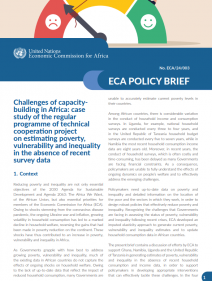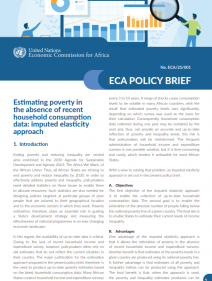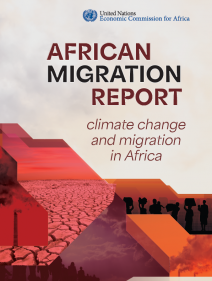Overview
Poverty and inequality remain persistent global challenges. While the global poverty rates have halved since 2020, one in ten people still live on less than USD $1.90 a day – the internationally agreed extreme poverty line. Despite significant progress, Africa is particularly affected by this problem, with 40 per cent of its people living in poverty.
Even with moderate positive economic performance, the poverty rate in Africa has not fallen fast enough and has been outstripped by population growth of 2.5 per cent. For instance, 433 million people in Africa were estimated to live in extreme poverty in 2018 compared to 284 million in 1990. They are confronted by a spectrum of inequalities that limit their access to nutrition, work, healthcare, education, among other basic services.
While threats to poverty eradication goals emerged well before COVID-19, the pandemic’s economic impact together with climate change and conflict are further reversing decades of progress on poverty around the world, especially in Africa. The fallout from the pandemic alone is expected to push an additional 51 million people into poverty in Africa.
Additional parallel developments further exacerbate the already fraught fault lines of poverty and inequality across Africa. The region is identified as one of the world’s most vulnerable continents to the impacts of climate change. Climate change impacts could push approximately 39.7 million people into extreme poverty in Africa (excluding Northern Africa). Moreover, the continent is undergoing a rapid urban transition - often inadequately planned and managed, without a commensurate increase in the availability of productive jobs, services and infrastructure.
At the same time, there are considerable emerging opportunities through which the progress in tackling poverty and inequality could be built upon and accelerated. The Africa Continental Free Trade Agreement (AfCFTA) could boost intra-Africa trade by at least 54 per cent and the region’s combined Gross Domestic Product (GDP) by USD $44 billion. In addition, Africa’s digital transformation and rapid urban growth offer considerable opportunities to advance job creation, income growth, productivity gains as well as access to health and education services.
Our Poverty, Inequality and Social Policy programme leverages data analysis, research, and capacity-building interventions to support the 54 African member states to develop and implement evidence-based policies to end extreme poverty and reduce inequality in an inclusive, sustainable, and equitable way, which leaves no individual or community behind.
Key areas of work

Our focus
We believe that eradicating the chronic challenge of poverty and reducing inequality are indispensable prerequisites for achieving equality, social cohesion and all Sustainable Development Goals (SDGs). Guided by this principle, our work supports member States in their efforts to improve equitable and sustainable access to health and education, reduce inequalities, create decent employment opportunities, promote sustainable urbanization, and manage migration flows through an inclusive, green, and resilient approach.
Our multi-faceted approach, cuts across think tank, operational and convening functions, supports member states in realizing their human, social and economic development targets – in line with their international commitments like the 2030 Agenda for Sustainable Development and regional priorities outlined in the African Union’s Agenda 2063 ‘The Africa We Want’. Our work is further anchored in specific frameworks such as the International Conference on Population and Development, the Global Compact on Migration, the Madrid International Plan of Action on Ageing, the New Urban Agenda, the 2030 Agenda for Sustainable Development and the African Union’s Agenda 2063.
1. Think tank
A core function of our work is collecting and analyzing data, and producing knowledge products which aim to strengthen the capacity of member states in developing evidence-based policy solutions to the challenges in areas such as job creation, women’s empowerment, social protection, population and development, and urbanization. In particular, we support member states in the following areas:
- Measuring the economic cost of human exclusion and crafting policies to unlock the gains of inclusive development;
- Generating cutting-edge knowledge for evidence-based policy options for poverty eradication, social investment and the protection of the economically vulnerable;
- Taking stock of progress, gaps and challenges in the implementation of regional and global commitments on social development;
- Producing innovative solutions, in partnership with stakeholders, to accelerate job creation, particularly for young people to leverage the demographic dividend; and
- Strengthening the evidence base and tools for member states to leverage cities and urbanization for economic growth and regional integration through spatially aligned economic policymaking.
2. Operational
We organize in-country technical workshops and training sessions for policymakers and relevant stakeholders to strengthen their policy knowledge, skills and institutional capacities. Our team offers this assistance to member States on a demand-driven basis. The purpose is to build local and national capacities, which can deliver tailored responses to unique challenges faced by member States at different stages of development.
With a focus on long-term sustainability, technical assistance is provided in many forms, including:
- The application of tailored policy tools and guidelines, the exchange of regional and global good practices, delivery of training and the promotion of regional cooperation for improved design, delivery and monitoring of policy and programme activities;
- The collection and analysis of local and national data on social, economic and spatial policy in a rapidly evolving and transformative space facing rapid demographic, urban, environmental and digital shifts; and
- The review of progress made by member states towards the implementation of regional and global agreements and frameworks, and the evidence-based recommendation for policy and programme interventions for human, social and spatial development at local, national and regional levels.
3. Convening
The ECA holds a significant convening power. We leverage it to bring together government officials and relevant stakeholders to coordinate and mobilize action on multilateral mandates that require regional collaboration. Our convening activities offer member states a crucial platform to discuss shared development challenges, explore policy options, foster coordinated response and strengthen regional cooperation.
In this vein, our teams regularly host a range of ministerial meetings, review forums, expert panels and policy dialogues with member states and a variety of stakeholders, including academics, UN agency representatives, civil society delegates and private actors, to coordinate and strengthen regional collaboration and cooperation on existing and emerging regional policy priorities. Our flagship intergovernmental events include:
- The annual Conference of African Ministers of Finance, Planning and Economic Development; and
- The biennial session of the Committee on Social Policy, Poverty and Gender.
Our commitment
At the ECA, we are committed to supporting member States to eradicate poverty and reduce inequality across the region, which is fundamental in creating fair, just, prosperous, and peaceful communities offering equal opportunities and higher standards of living for all.
Related links:
Last updated: 7 September 2021





![[Blog] Africa's urban boom: shaping a prosperous, sustainable, and inclusive future](https://uneca.org/sites/default/files/styles/tumbnail_436_x_221/public/storyimages/shutterstock_2387455777_1920x640.jpg?itok=NZTPHBRx)


